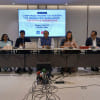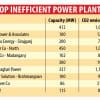Corruption remains main hurdle for businesses

Similar to previous years, corruption was the top problematic factor for businesses in 2023 while inadequate supply of energy poses the highest risk to the nation's economy over the next two years, found a survey conducted by the Centre for Policy Dialogue (CPD).
A majority of respondents, around 67.6 percent, complained about the high levels of corruption.
A lack of effective measures to curb corruption as well as a dearth of transparency and accountability in public agencies is causing the business environment to weaken, said Khondaker Golam Moazzem, research director at the CPD.
He was speaking at a briefing titled "Bangladesh Business Environment 2023" at the CPD office in Dhaka, which incorporated findings from the "Executive Opinion Survey" carried out between May and July of 2023. It surveyed 71 senior officials of small, medium and large companies of different sectors.
Among the top three problematic factors, inefficient government bureaucracy came in second as 54.9 percent of respondents identified it as a problem area while foreign currency instability ranked third, with 46.5 percent complaining about it.
Before 2022, foreign currency instability ranked among the bottom three factors that presented a hurdle to businesses, with less than 10 percent of respondents identifying it as a barrier. But it jumped into the top five over the past two years.
In the same vein, inflation, which was in the bottom three of problematic factors in the previous years, jumped to fifth among problematic factors over the past two years.
On a positive note, businessmen's perception regarding inadequate infrastructure, which was considered one of the top three problematic factors over the past two years, slightly improved, ranking as the fourth-most problematic factor.
According to the CPD, the performance of institutions during the past six years, from 2018 to 2023, has been negative or stagnant.
"The government's outlining of a long-term vision is the sole positive thing here. We also welcome it like businesses," Moazzem said.
Businessmen also opined that there has been a slight improvement in the situation related to bribes in the last three years, although the culture of undocumented extra payments persists.
Bribes are largely common in connection with imports and exports, tax payments, and awarding of public contracts and licenses.
Lack of independence of the judicial system, low ethical standards of politicians, and difficulty for private businesses to challenge government actions or regulations through the legal system was also commonly observed.
Performance has further deteriorated in 2023 in the case of bribes for imports and exports, and in terms of the ethical standards of politicians, according to the survey findings.
"Bribes create greater inequality. A businessperson told me that the amount of bribe sought for a simple connection was larger than what he had budgeted for the entire cost of business operations," Moazzem said.
The study also identified a set of risks that could impact the economy and society over the next two years.
About 66.2 percent of the business owners anticipated that Bangladesh would face an energy supply crisis in the next two years, disrupting their production.
"If the government had started gas exploration, the gas crisis would not have been this severe. But the government opted for import-dependent LNG gas, leading to this crisis," Moazzem said.
In terms of economic risks, inflation posed the biggest threat as identified by half of the respondents, followed by an economic downturn such as recession or stagnation.
Yet, the most persistent issue in the nation over the years has been corruption.
The government needs to strengthen institutional mechanisms to combat corruption, according to Moazzem.
Bribes remain common across various sectors and it is crucial to develop and promote easily accessible digital payment systems to address this issue, he added.
The new government, based on its election manifesto, should disclose its strategies on how its different ministries and departments will address corruption in terms of public procurement, registration, licensing, permissions and official orders.
Meanwhile, about 48 percent of respondents agreed that the soundness of banks was extremely low while 53.5 percent somewhat agreed that the financial system was unable to respond to crises.
Major institutions of the banking sector such as Bangladesh Bank, the Ministry of Finance, Bangladesh Securities and Exchange Commission and commercial banks have largely failed to curb the deceleration in the banking sector.
Most public entities are averse to major reform measures aimed at improving the soundness of the banking sector, Moazzem said.
The study recommends that the government take the initiative to set up independent offices of ombudspersons with proper legal, institutional and operational responsibilities and facilities.
All public offices should introduce an ombudsperson to address governance-related issues.
The financial sector should also introduce banking ombudspersons and others such as securities ombudspersons, tax ombudspersons, law enforcement ombudspersons and trade ombudspersons, it added.
On another note, Bangladesh demonstrated considerable progress in infrastructural development last year, specifically in road and transportation.
The air transport system has notably improved while innovativeness-related physical resources, particularly digital infrastructure facilities, have shown positive trends, according to survey findings.
There has been increased use of digital platforms to avail professional services, including hotels, restaurants, leisure activities and financial services.

 For all latest news, follow The Daily Star's Google News channel.
For all latest news, follow The Daily Star's Google News channel. 








Comments